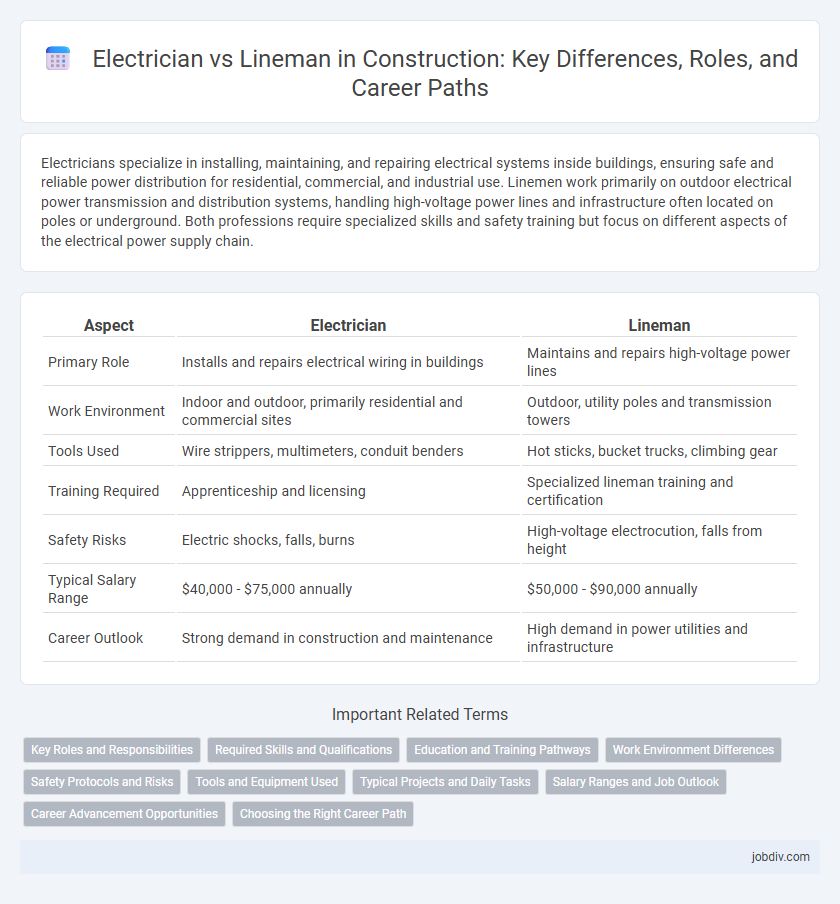Electricians specialize in installing, maintaining, and repairing electrical systems inside buildings, ensuring safe and reliable power distribution for residential, commercial, and industrial use. Linemen work primarily on outdoor electrical power transmission and distribution systems, handling high-voltage power lines and infrastructure often located on poles or underground. Both professions require specialized skills and safety training but focus on different aspects of the electrical power supply chain.
Table of Comparison
| Aspect | Electrician | Lineman |
|---|---|---|
| Primary Role | Installs and repairs electrical wiring in buildings | Maintains and repairs high-voltage power lines |
| Work Environment | Indoor and outdoor, primarily residential and commercial sites | Outdoor, utility poles and transmission towers |
| Tools Used | Wire strippers, multimeters, conduit benders | Hot sticks, bucket trucks, climbing gear |
| Training Required | Apprenticeship and licensing | Specialized lineman training and certification |
| Safety Risks | Electric shocks, falls, burns | High-voltage electrocution, falls from height |
| Typical Salary Range | $40,000 - $75,000 annually | $50,000 - $90,000 annually |
| Career Outlook | Strong demand in construction and maintenance | High demand in power utilities and infrastructure |
Key Roles and Responsibilities
Electricians specialize in wiring buildings, installing lighting systems, and maintaining electrical components to ensure safety and functionality within residential or commercial structures. Linemen primarily work on high-voltage power lines, focusing on the installation, maintenance, and repair of electrical transmission and distribution networks to deliver electricity from power plants to end users. Both roles require extensive knowledge of electrical systems, but linemen typically operate outdoors and at greater heights, emphasizing infrastructure reliability and emergency response.
Required Skills and Qualifications
Electricians require a strong understanding of electrical systems, wiring, and safety protocols, often obtaining OSHA certification and completing apprenticeships. Linemen need advanced physical endurance, specialized training in high-voltage line work, and certifications like CPR and pole-top rescue. Both professions demand precise technical skills, but linemen focus more on outdoor infrastructure maintenance, while electricians handle indoor wiring and electrical installations.
Education and Training Pathways
Electricians typically complete a four- to five-year apprenticeship program combining classroom instruction and on-the-job training, focusing on residential, commercial, and industrial electrical systems. Linemen often undergo specialized training through technical schools or military programs, emphasizing high-voltage power line installation, maintenance, and safety protocols. Both professions require certification or licensing, with linemen receiving extensive training in climbing, rigging, and working outdoors in varying weather conditions.
Work Environment Differences
Electricians typically work indoors on residential, commercial, or industrial wiring, focusing on installing and maintaining electrical systems within buildings. Linemen operate outdoors, often at great heights, maintaining and repairing high-voltage power lines and electrical grids exposed to weather conditions. The work environment for linemen involves more physical risks due to exposure to live wires and extreme weather, whereas electricians face confined spaces with potential electrical hazards.
Safety Protocols and Risks
Electricians and linemen both face significant safety risks, with electricians primarily dealing with indoor wiring hazards such as electrical shock and fire, while linemen encounter outdoor dangers including high-voltage lines, falls, and weather exposure. Strict adherence to safety protocols like lockout/tagout procedures, use of personal protective equipment (PPE), and regular safety training is critical for minimizing accidents in both professions. Understanding the specific risks associated with each role allows for targeted safety measures to protect workers in construction environments.
Tools and Equipment Used
Electricians primarily use multimeters, wire strippers, conduit benders, and voltage testers to install and maintain electrical wiring and systems within buildings. Linemen rely on specialized equipment such as climbing gear, insulated gloves, hot sticks, and bucket trucks to safely work on high-voltage power lines and outdoor electrical infrastructure. Both professions require precise tools tailored to their specific environments to ensure safety and efficiency in electrical installations and repairs.
Typical Projects and Daily Tasks
Electricians primarily handle wiring installations, maintenance, and troubleshooting in residential, commercial, and industrial construction projects, ensuring compliance with electrical codes and safety standards. Linemen focus on the construction, repair, and maintenance of overhead and underground power lines, often working on utility infrastructure projects such as power distribution and transmission systems. Daily tasks for electricians include reading blueprints, installing circuit breakers, and testing electrical systems, while linemen routinely climb poles, operate heavy equipment, and restore power during outages.
Salary Ranges and Job Outlook
Electricians typically earn median annual salaries between $50,000 and $65,000, with job growth projected at 8% over the next decade due to increasing demand in residential and commercial construction. Linemen, specialized in power line installation and maintenance, command higher median salaries ranging from $65,000 to $85,000, driven by the essential role in energy infrastructure and a steady 5% projected employment growth. Both professions require technical expertise, but linemen often face more hazardous working conditions, influencing their compensation and demand within the construction and utility sectors.
Career Advancement Opportunities
Electricians gain career advancement by specializing in residential, commercial, or industrial systems, often progressing to supervisory or project management roles, with certifications such as Certified Electrician boosting credentials. Linemen advance by mastering high-voltage power line installation and maintenance, frequently moving into roles like line foreman, safety coordinator, or utility engineer, supported by union apprenticeships and OSHA safety training. Both careers offer growth through continuous education, technical skill development, and experience in increasingly complex electrical infrastructure projects.
Choosing the Right Career Path
Electricians specialize in wiring, electrical systems installation, and maintenance within residential, commercial, and industrial buildings, requiring knowledge in circuitry and electrical codes. Linemen focus on installing and repairing high-voltage power lines, often working outdoors with utility companies to maintain electrical grid infrastructure. Selecting the right career depends on whether you prefer indoor technical work with varied systems or outdoor physical tasks involving power distribution networks.
Electrician vs Lineman Infographic

 jobdiv.com
jobdiv.com